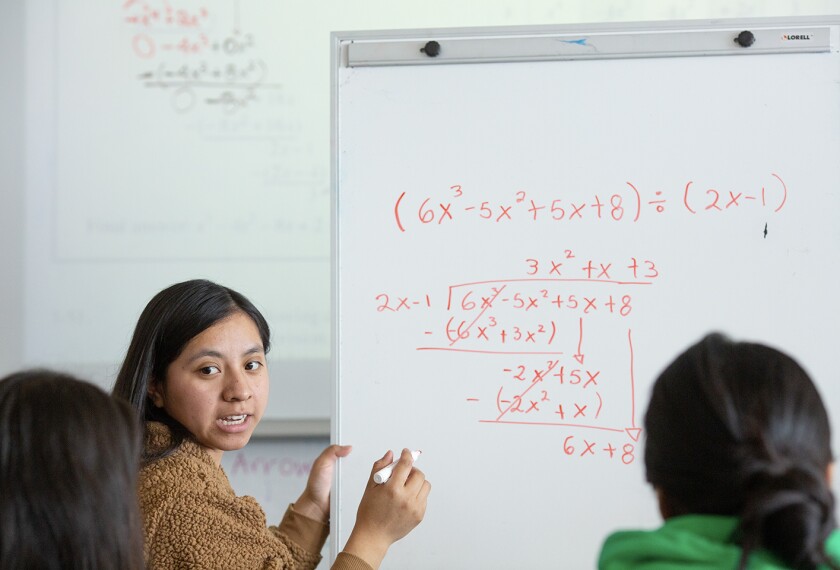Principals are more than twice as likely as after-school program personnel to say the primary focus of after-school programs for elementary, middle, and high school students should be providing academic support, according to a new Education Week Research Center survey.
The findings come as many students still need to catch up on unfinished learning more than two years after the COVID-19 pandemic disrupted instruction.
The survey of 269 K-12 principals and 712 after-school program personnel, conducted May 31 to June 10, found 56 percent of respondents said that the primary focus of after-school programs for elementary students should be giving students opportunities to have fun in a safe environment, 18 percent said providing academic support, 12 percent said providing social-emotional learning support, 11 percent said helping parents balance the needs of work and family, and 4 percent said helping students develop workplace skills.
When the numbers are broken down by job title, 29 percent of principals said that academic support should be the primary focus of after-school programs for elementary students, compared with 14 percent of after-school personnel. A slight majority of after-school personnel (59 percent) said the focus should be on having fun, and 46 percent of principals agree.
In a section of the survey where respondents can share a story or perspective, one middle school principal in Mississippi said after-school programs “have their place in education” and should focus on “the remediation of students who are struggling academically.”
The principal also suggested that after-school programs keep the school calendar in mind and provide “short remediation, enrichment, college courses, ACT prep, and work skills development” during short breaks. After-school programs can provide intervention and help students become more successful and prepared for their future, the principal said.
An after-school director in Connecticut said the school’s after-school program, which serves mostly students from non-English-speaking households, is “providing intense academic support for our students,” who have seen a “huge need since the pandemic.”
An argument for a focus on fun
But others have a different take.
Kimberly Jordan, a principal of Sunrise Elementary School in Albany, Ore., is part of the 46 percent of principals who think the focus of after-school programs should be on having fun.
“I think [students] need to have fun engagement with other children doing things that they enjoy,” Jordan said. “The academics can be supported. But children need to be able to have structured fun time, where they can be children and benefit from relationships and positive environments.”
“Some principals might be saying academics because we want to help kids to capture that unfinished learning,” she said. “I also think that we are in such a competitive world that we want to be the best and we want our kids to be the best.”
Helping students improve their academic skills in after-school programs isn’t a bad thing, she added, but if it’s the only focus, then kids might not become as well-rounded as they need to be in order to be happy and successful. Academics can be taught through fun activities, she said.
Jodi Grant, the executive director of the Afterschool Alliance, agreed. She said after-school programs are “very sophisticated in ensuring that kids are learning but making it fun.”
Principals who are more focused on academics for after-school programs might just be doing that because that’s how their success is measured, through tests and grades, Grant said.
For middle and high school students, there is more disagreement about what the primary focus of after-school programs should be:
- 31 percent of survey respondents said the focus should be academics;
- 29 percent said fun;
- 21 percent said workplace skills;
- 14 percent said social-emotional learning, or SEL, support;
- and 5 percent said helping parents balance the needs of work and family.
Again, when broken down by job title, principals were almost twice as likely as after-school personnel to say academics should be the primary focus for middle and high school students. Forty-five percent of principals said the focus should be on academics, and 26 percent of after-school personnel agreed. Twenty-three percent of principals said the focus should be on having fun, and 32 percent of after-school personnel agreed.
Melissa Barnett, a principal at South Pointe Junior High School in Phoenix, Ariz., said that while academics are important, especially because “we have a lot catching up to do,” after-school programs should focus on giving kids the socialization and life skills they need for their future.
Greater attention to social-emotional learning
The EdWeek Research Center also found that 64 percent of after-school personnel and 49 percent of principals said after-school programs are more focused on social-emotional learning now than before the pandemic.
Barnett said she is “seeing how much we have to go backwards to go forward. I think we just need to get [students] revamped with having social skills [and] life-ready skills.”
“It’s not about junior high. It’s not about high school. It’s really about your life and where you’re going and what skills and knowledge you are taking with you,” she added.
Grant said teaching workforce skills is a “sweet spot” for after-school programs.
“It’s learning, but it’s learning in different ways. It’s learning to be part of a team, it’s learning to collaborate, it’s learning to get something done on time,” she said.





